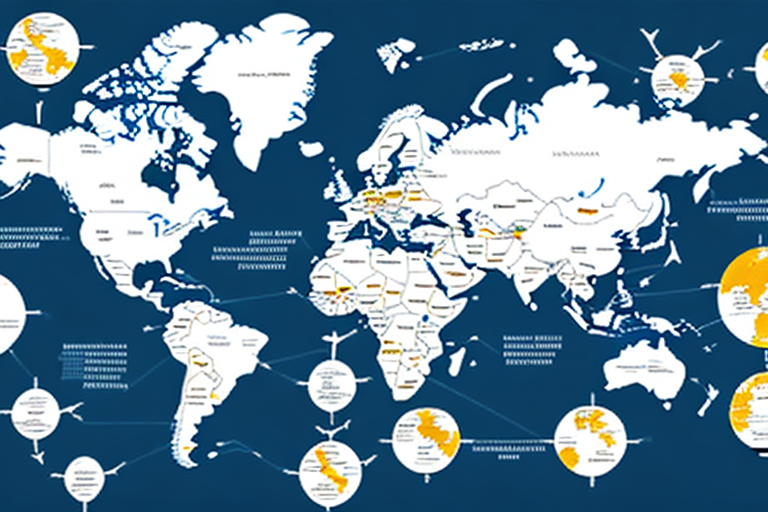Selling Internationally: Top Countries and Strategies for Global Success
Selling products or services internationally presents a significant opportunity for businesses to expand their reach and increase profits. However, the ease of selling can vary greatly from country to country. This article explores the top countries that are easiest to sell to internationally, the factors that make them appealing, and effective strategies for global sales expansion.
Key Factors That Make a Country Easy for International Sales
Understanding the factors that contribute to a country's attractiveness for international sales is crucial before targeting new markets. Businesses should consider the following:
- Ease of Doing Business: Assessed by indices like the World Bank’s Global Ease of Doing Business
- Legal and Regulatory Environment: Requirements for foreign businesses, including permits and licenses
- Tax Implications: Corporate tax rates, VAT, and other tax considerations
- Cultural Considerations: Local customs, traditions, and language
- Market Demand: Potential demand for products or services backed by market research data
- Infrastructure Quality: Availability of transportation, communication, and technology
A well-developed infrastructure facilitates the smooth transportation of goods, effective communication with customers and suppliers, and efficient transaction processes. Additionally, robust technological infrastructure enables businesses to leverage digital marketing and e-commerce platforms to reach a broader audience.
Top 10 Countries for International Business Ease
Based on the latest available data, the following are the top 10 countries that are easiest to conduct business internationally:
- Singapore
- New Zealand
- Denmark
- South Korea
- Hong Kong SAR
- United States
- United Kingdom
- Norway
- Sweden
- Finland
These countries excel in areas such as starting a business, accessing credit, protecting minority investors, and enforcing contracts. They also boast stable political and economic environments, making them attractive for businesses aiming to expand internationally.
It's important to note that while the ease of doing business is a significant factor, other elements like cultural differences, language barriers, and specific market demand should also be considered.
Cultural Considerations for International Sales
Understanding and respecting cultural differences is vital when selling to international markets. Key cultural factors include:
Communication Styles
Cultures vary in their communication preferences. For example, some may value direct communication, while others prefer a more indirect approach. Adapting your communication style can improve customer relations and business negotiations.
Business Etiquette
Different countries have unique business etiquettes, such as greeting customs, meeting protocols, and gift-giving practices. Familiarizing yourself with these can enhance business relationships.
Perception of Time
The importance of punctuality varies across cultures. In some, being on time is crucial, while in others, there is more flexibility. Understanding these perceptions can prevent misunderstandings and foster positive interactions.
Legal and Regulatory Requirements for International Sales
Complying with the legal and regulatory frameworks of each target country is essential to avoid legal and financial repercussions. Key considerations include:
- Business Registration: Legal entity formation and registration processes
- Permits and Licenses: Required permits for operating in specific industries
- Labor Laws: Regulations regarding employment, wages, and workplace safety
- Tax Compliance: Adhering to local tax laws, including VAT and corporate taxes
Engaging with local legal experts or consultants can help navigate these complex requirements effectively.
Tax Implications of International Sales
International sales come with various tax obligations that businesses must address:
Value-Added Tax (VAT)
Many countries impose VAT on goods and services. Understanding the VAT rates and registration requirements in each country is crucial for compliance.
Customs Duties and Import Taxes
When importing goods, businesses may be subject to customs duties and import taxes. Properly classifying products and understanding tariff schedules can minimize these costs.
Transfer Pricing
Multinational businesses must adhere to transfer pricing regulations to prevent tax evasion and ensure fair pricing between subsidiaries.
Consulting with international tax professionals can help businesses navigate these complexities and optimize their tax strategies.
Effective Market Research Strategies for International Expansion
Conducting thorough market research is a cornerstone of successful international expansion. Strategies include:
Demographic Analysis
Analyzing population demographics helps identify target segments and tailor products to meet local needs.
Consumer Behavior Studies
Understanding local consumer preferences and purchasing behaviors enables businesses to develop effective marketing strategies.
Competitive Analysis
Assessing the competitive landscape provides insights into market saturation and potential opportunities for differentiation.
Partnering with Local Experts
Collaborating with local organizations or hiring consultants offers valuable on-the-ground insights and facilitates smoother market entry.
Building a Successful International Sales Team
A competent and culturally aware sales team is essential for international success. Consider the following when building your team:
- Language Skills: Team members should be fluent in the local language to communicate effectively with customers and partners.
- Cultural Competence: Understanding and respecting local customs and business practices
- Local Expertise: Hiring individuals with experience in the target market can provide valuable insights and connections
- Technological Proficiency: Utilizing CRM systems and other sales technologies to manage international sales processes
Providing ongoing training and support ensures that the sales team can adapt to changing market conditions and maintain high performance.
Tailoring Your Marketing Strategy for International Audiences
Adapting marketing strategies to resonate with local audiences is crucial for international success. Key strategies include:
Localization of Content
Translating marketing materials and adapting messages to align with local languages and cultural nuances enhances engagement.
Utilizing Local Platforms
Leveraging local social media platforms and digital channels ensures that marketing efforts reach the intended audience effectively.
Collaborating with Local Influencers
Partnering with local influencers can increase brand credibility and expand reach within the target market.
Compliance with Local Advertising Laws
Ensuring that marketing campaigns adhere to local advertising regulations prevents legal issues and maintains brand reputation.
Partnering with Established Local Businesses
Forming partnerships with local businesses can facilitate smoother market entry and enhance credibility. Benefits include:
- Market Insights: Local partners provide valuable knowledge about consumer behavior and market trends
- Established Networks: Access to existing distribution channels and customer bases
- Regulatory Guidance: Assistance in navigating local legal and regulatory requirements
- Shared Resources: Leveraging combined resources for marketing, logistics, and operations
Choosing reputable and aligned partners ensures mutual benefits and long-term success in the foreign market.
Overcoming Challenges in International Sales
Expanding internationally presents various challenges that businesses must address proactively:
Language Barriers
Miscommunications can lead to misunderstandings and lost sales. Investing in translation services and hiring multilingual staff can mitigate this risk.
Regulatory Compliance
Non-compliance with local laws can result in penalties and damage to reputation. Regular audits and legal consultations are essential.
Cultural Misunderstandings
Failure to respect cultural differences can harm business relationships. Providing cultural training to employees fosters better interactions.
Logistical Complexities
Managing international logistics requires efficient planning and reliable partners to ensure timely delivery and cost-effective operations.
Currency Fluctuations
Exchange rate volatility can impact profitability. Utilizing financial instruments like hedging can protect against currency risks.
Case Studies of Successful International Expansion
Examining the strategies of companies that have effectively expanded internationally provides valuable lessons:
Coca-Cola
Coca-Cola has successfully localized its product offerings and marketing campaigns to suit diverse cultural preferences while maintaining a consistent global brand presence.
McDonald’s
McDonald’s adapts its menu to cater to local tastes and dietary preferences, ensuring relevance and acceptance in various markets worldwide.
Apple Inc.
Apple leverages a strong global brand and high-quality products, combined with strategic retail partnerships, to maintain a significant presence in international markets.
The Role of Technology in International Sales
Technology plays a pivotal role in facilitating and enhancing international sales operations:
Online Marketplaces
Platforms like Amazon and Alibaba provide access to vast international customer bases, simplifying the process of reaching new markets.
Digital Marketing Tools
Tools such as SEO, social media marketing, and email campaigns allow for targeted and effective marketing strategies tailored to specific regions.
Customer Relationship Management (CRM) Systems
CRM systems help manage customer interactions, track sales performance, and analyze customer data to inform strategic decisions.
Supply Chain Management Software
Advanced software solutions streamline logistics, inventory management, and order fulfillment, ensuring efficient operations across borders.
Managing Logistics and Supply Chains for Global Sales
Effective logistics and supply chain management are critical for the success of international sales:
- Reliable Shipping Partners: Collaborating with reputable logistics providers ensures timely and secure delivery of products
- Inventory Management: Maintaining optimal inventory levels across different locations prevents stockouts and overstock situations
- Customized Packaging: Adapting packaging to meet local regulations and consumer preferences enhances product appeal
- Tracking and Visibility: Implementing tracking systems provides real-time visibility into shipment status and inventory levels
Investing in robust supply chain technologies and establishing contingency plans can help mitigate potential disruptions and maintain seamless operations.
Future Trends in International Sales and How to Prepare
The landscape of international sales is continuously evolving. Staying ahead of emerging trends ensures sustained success:
Increased Use of Artificial Intelligence
AI-driven tools enhance data analysis, customer insights, and personalized marketing efforts, enabling more efficient and targeted sales strategies.
Growth of E-Commerce
The expansion of online shopping platforms provides new avenues for reaching global customers, necessitating optimized digital sales strategies.
Sustainability and Ethical Practices
Consumers increasingly prioritize sustainability and ethical business practices. Adopting green initiatives and transparent operations can attract conscientious customers.
Enhanced Cybersecurity Measures
As digital transactions rise, ensuring robust cybersecurity protocols protects against data breaches and builds customer trust.
Adoption of Blockchain Technology
Blockchain offers secure and transparent transactions, improving supply chain transparency and reducing fraud risks.
Personalization and Customer Experience
Delivering personalized experiences through advanced data analytics and customer engagement strategies enhances brand loyalty and sales conversions.
Conclusion
Expanding sales internationally offers lucrative opportunities for businesses willing to navigate the complexities of global markets. By understanding the key factors that ease international sales, leveraging cultural insights, complying with legal requirements, and utilizing advanced technologies, businesses can successfully establish and grow their presence in foreign markets. Continuous adaptation to emerging trends and proactive management of challenges will ensure long-term success in the global arena.




















